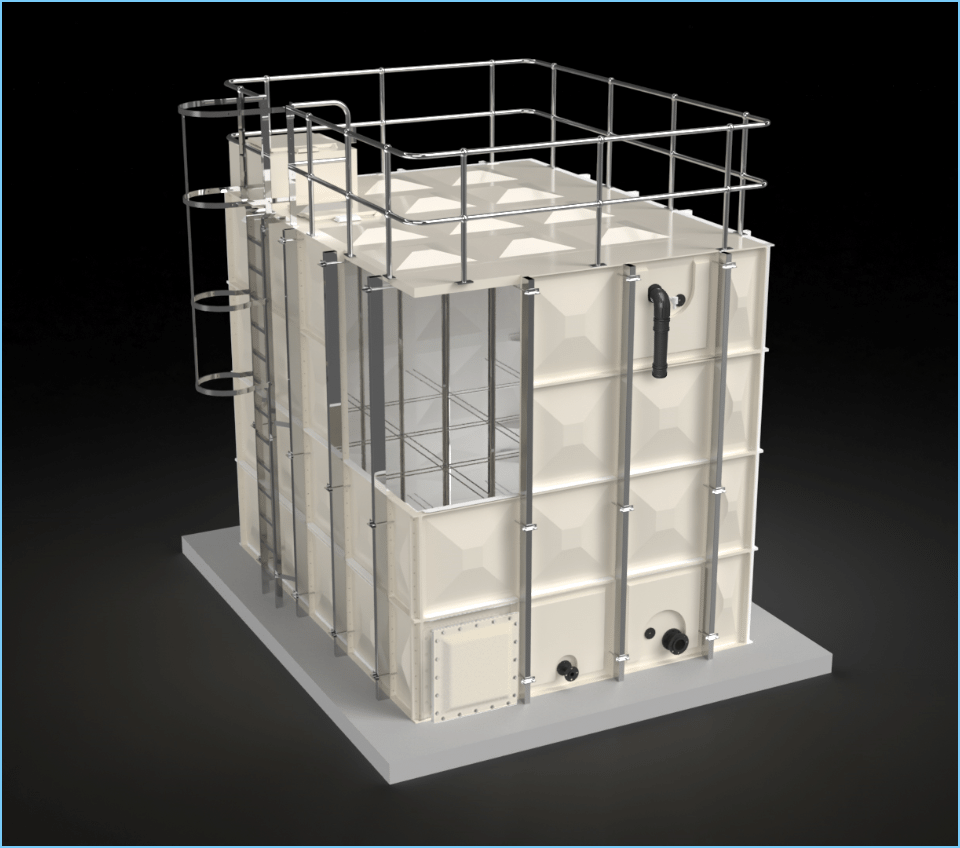Insulated Water Tanks
View Our List of Accreditations
View our full list of accreditations here!
View Our Latest Articles
Keep up to date with the latest industry news here at Tricel Weston.
Click the links below to view our latest articles!
Register For Our CPD Course
How Insulated Water Tanks Work
Factors to Consider When Choosing an Insulated Water Tank:
- Tank size
- Type of insulation
- Intended use of the water tank
- Tank manufacturer
Insulated water tanks are typically used to store potable water safe for human consumption. Tricel Weston range of Regulation 4(1)a certified One Piece Tanks and Totally Internally Flanged (TIF) Tanks come with 25mm standard insulation with the option to increase it to 50mm. Our Hotpress Sectional Tanks, all come with a standard insulation of 38mm, which can be increased to 50mm depending on our customer’s given need. We offer uninsulated water tanks, typically used for storing water for non-wholesome applications.
Applications of Insulated Water Tanks:
- Agriculture
- Healthcare
- Food Processing
- Domestic day-to-day
- Commercial & Industrial
Benefits of Water Tank Insulation
An insulated water tank offers various advantages:
Energy Efficiency
An insulated water tank reduces the energy required to maintain water temperature, lowering energy bills. When an uninsulated water tank is used, energy is lost by having to either cool or heat the water to the desired temperature. Over time, this can become a costly practice. An insulated tank maintains its temperature and is a proven method of having an energy-efficient water storage tank.
Preventing Heat Loss
This is a key benefit, especially in the cold winter season, as the water tank insulation minimises heat loss, ensuring your cold water supply stays cool. Water tanks located in colder regions across the UK must be insulated to reduce the risk of the water tank from freezing and cracking.
Reducing Condensation
Typically, water tank insulation is designed to prevent condensation from building up outside the tank, protecting it from moisture damage. Inside the tank, condensation can eventually lead to mold, which will contaminate the water supply.
Extending the Lifespan of the Tank
An insulated water tank has an extended lifespan by maintaining consistent temperatures and minimising stress on the tank.
How to Keep the Water in a Water Tank From Freezing
The concern of water storage tanks freezing during winter is common, especially in regions where temperatures can drop below freezing. Above-ground water storage tanks require insulation to prevent any heat loss. If the water supply freezes, this could result in a disrupted water supply and damage to the water tank itself.
Temperature Sensors
When water is stored for human consumption or food production, the water must be kept under 20°C. Regulation 4(1)a states that the water storage tank must be insulated, with the temperature regularly monitored. The main reason behind this is Legionella prevention. The Legionella bacteria thrives in water between temperatures of 20-45°C. Keeping the water temperature lower than this and above 60°C eliminates the threat of the bacteria.
However, because cold water storage tanks are not designed to keep water at high temperatures, it is essential to install temperature sensors to keep the temperature below 20°C. By installing a temperature sensor, our customers can monitor and control the temperature of cold water storage tanks during winter. The sensors will trigger the heating system to activate when the temperature drops below a set temperature. Advanced systems may even provide remote monitoring and alerts, allowing facility managers to respond to temperature fluctuations promptly. If you require temperature sensors included with your purchase for one of our water storage tanks, we can include this in our quote.
Frost Protection
If the water in the tank is constantly turning over, the risk of freezing is reduced. Frost protection is used to compensate for heat loss. M&E Consultants can decide whether frost protection is necessary for your specified water storage tank. In that case, we can provide 50mm insulation instead of the standard 38mm insulation.
The cost of adding frost protection is worth it when compared to the costs of damage caused to tanks as a result of freezing or, worse, interrupted operations. Protecting cold water storage tanks from frost is crucial to prevent damage and ensure a reliable water supply during the winter months. One effective method is to insulate the tanks, which helps retain heat and to avoid freezing.
In freezing climates, it may be necessary to use heat tracing or immersion heating in combination with insulation for comprehensive frost protection.
Trace Heating & Immersion Heating
Trace heating and immersion heating alone will not prevent a water tank from freezing. Proper positioning of the ball valve and immersion heater is imperative to prevent surface water freezing in a water storage tank. The key lies in optimising heat distribution and placing them on opposite ends disrupts the cohesive heat distribution, resulting in localised warming in one spot and insufficient coverage. This is important because the surface water can freeze in extreme temperatures.
Trace heating is a method that provides a consistent source of warmth and is typically used for large water tanks or those located in unheated plant rooms.
DEWEY WATERS FEATURES
Specialising in the manufacture of both one piece and sectional cold water storage tanks, our experience ensures that we are able to accommodate virtually all client requirements.
On time Delivery
Placing and receiving your order is a straightforward, hassle-free process.
Technical Advice
We provide high levels of technical knowledge, product choice and customer service.
Fully Certified
Dewey Waters is an accredited & certified GRP water tank manufacturer.
Experts Installation
60 years’ industry experience in both Water Storage and GRP industries.
On Time Delivery
Placing and receiving your order is a straightforward, hassle-free process.
Technical Advice
We provide high levels of technical knowledge, product choice and customer service.
Fully Certified
Dewey Waters is an accredited & certified GRP water tank manufacturer.
Experts Installation
60 years’ industry experience in both Water Storage and GRP industries.
WORK WITH US ON YOUR NEXT PROJECTS
60 years’ industry experience, trusted & reputable supplier. View some of our projects on TIF, Rainwater Harvesting, LPCB installations, Data Centres, Holiday parks, Shopping Centres, Residential buildings, International installations, Custom Moulded Tanks and more. Our expertise include supplying crtitical water storage tanks for healthcare services.
View our testimonials
Contact our experts


